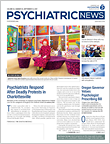The white nationalist rally in Charlottesville, Va., on Saturday, August 13, escalated from intimidation to outright violence when a participant drove his car into a crowd of counterprotestors, injuring over 30 people and killing 32-year-old Heather Heyer.
Before the rally had started, members of the University of Virginia’s (UVA) Department of Psychiatry and Neurobehavioral Science had joined with others in the hospital to prepare for potential injuries, said Anita Clayton, M.D., a professor and department chair. When possible, patients were discharged early to free up bed space. However, once the incident was under way, the university locked down the campus and access in or out of the medical center became more difficult, even as it was needed most.
The university’s psychiatry department then went to work to help colleagues throughout the hospital, said Clayton. “We provided care in the emergency department, the hospital, and on the psychiatry unit through the weekend.”
They held town-hall style meetings with medical residents and School of Medicine faculty. Many expressed their fears over the weekend events and their dismay over negative Internet comments about the city and the university. Many were shocked that such an event could occur in such a progressive-minded community.
Among the 30 injured were a psychiatry department staff member and her daughter, said Clayton.
“We talked with psychiatry residents by class year because they already felt a sense of kinship with each other,” said Clayton. Some talked about how the white nationalist demonstrators had come into their churches to intimidate members. Black and Jewish staff members expressed particular fears, given the presence of the Ku Klux Klan and neo-Nazis among the demonstrators.
“We told them how we supported them and that we would not tolerate discrimination,” she said.
Members of the psychiatry department also helped out across the university’s medical community, said Amit Shahane, Ph.D., an assistant professor of psychiatry and neurobehavioral science and director of the Behavioral Medical Center.
“We met separately with surgery faculty and residents to help them process their experiences after they cared for the injured,” said Shahane in an interview. “There was a general tension between our responsibility as providers to care for everyone and having to deal with people we didn’t agree with in an intense way. Overall, I think our health care system responded in an effective way to a horrific situation.”
Zachariah Dameron, M.D., an associate professor of psychiatric medicine and residency program director at UVA, connected by email with his former colleague, Edward Kantor, M.D., now an associate professor and director of resident training at the Medical University of South Carolina in Charleston. Kantor, formerly on the UVA faculty, serves on APA’s Committee on the Psychiatric Dimensions of Disasters and was involved in the responses to both the Virginia Tech and Charleston church mass shooting events.
Kantor suggested to Dameron that the department could help the university and the broader Charlottesville community by focusing on how to mitigate the effects of the immediate crisis and also start thinking about what to do the next time one occurred.
Charlottesville’s experience also is another reminder that disasters and tragedies can happen anywhere. Advance preparation and coordination with the rest of the emergency response system can help communities and psychiatrists better prepare for them, said Kantor. In Charleston before the June 2015 shooting, the mental health community was already working with the sheriff, the state’s attorney, community mental health centers, and others. Knowledge of each group’s role and expertise and expectations derived from pre-planning and past response informed the response there. Getting psychiatry staff involved in preplanning for a disaster and developing specific roles can make responses more effective.
Meantime, Clayton is also taking a deeper look into the future for her community and her university.
“We’ll be dealing with this for a long time,” said Clayton. “It’s not easy to get over. You can’t be silent, and you can’t be passive. As a university community, we have a chance to stand together more and stand up for our values, the values of diversity, equality, and inclusiveness.” ■
Disaster response information and resources are posted on
APA’s website.
